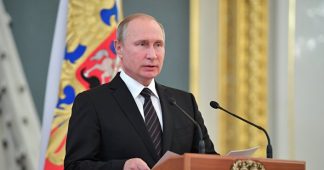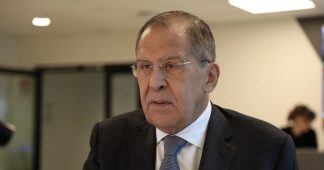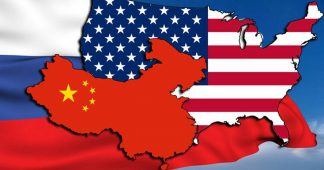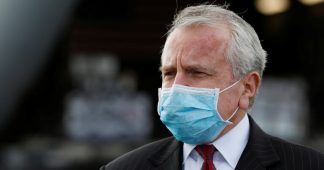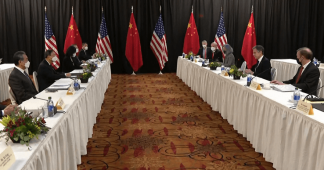Published
Jun 11, 2021
Editor’s Note:
China and Russia have seen increasing interactions and closer bonds as they face amid US pressure. The trilateral relations of China, Russia and the US are of great significance in the international order. Ahead of the upcoming Putin-Biden summit, Global Times reporters Xie Wenting and Bai Yunyi (GT) interviewed Russian Ambassador to China Andrey Denisov (Denisov) on a range of issues including bilateral and trilateral relations, COVID-19, and many others.
GT: Russian President Vladimir Putin and US President Joe Biden will meet in Geneva on June 16. What are your expectations for the meeting? How do you evaluate the possibility of improvement in Russia-US relations during Biden’s presidency?
Denisov: We are realists. We do not expect impossible outcomes. We welcome any measures that reduce tensions and competition, but we are very cautious about what we can expect from the Russian-American relations, especially in the context of the very tense relations between the two countries. The Geneva summit, the first meeting between the two leaders since Biden took office, is less likely to resolve important issues between the two countries. A better outcome, though, is that it sets the conditions for resolving problems in the future.
GT: Some analysts suggest the Biden administration may take measures to ease tensions with Russia in order to concentrate on dealing with China. Will this strategy alienate Russia from China and draw it closer to the US?
Denisov: This view is too short-sighted. It can’t happen. I think we’re smarter than what the Americans think.
GT: Russian Foreign Minister Sergei Lavrov visited China after the China-US meeting in Anchorage, while China’s top diplomat Yang Jiechi visited Moscow after a Russia-US foreign ministers’ meeting. Was the timing of these two visits deliberately arranged? What signal did this send?
Denisov: As for the timing, it was purely coincidental that the two visits followed the high-level talks between China and the US in Anchorage and between Russia and the US in Iceland. It takes time and technical preparation to arrange a visit at the level of foreign minister and above.
When Russia was preparing for Russian Foreign Minister Sergei Lavrov’s visit to China, it was not aware that senior diplomats from China and the US would meet in Anchorage. The same goes for Director Yang Jiechi’s visit to Russia.
But it is a good thing that these two diplomatic interactions came on the heels of Russia and China’s conversations with the US. It will give senior diplomats from both countries an opportunity to have an in-depth discussion on what has happened in previous meetings between China and the US and between Russia and the US.
GT: Do Russia and China coordinate and communicate with each other on their stance toward the US?
Denisov: A principle in international political exchanges is that the question of an absent third party should not be discussed in the exchanges. However, this principle is almost never observed. A case in point is US President Biden’s trip to the UK for the G7 summit. Although Chinese representatives will not be present at the meeting and will not be able to express their positions, the US has announced that it will discuss its policy toward China with its European Allies.
In this context, the US topic certainly occupies a place on the agenda of the meeting between senior Chinese and Russian diplomats. Although the last two visits were short and had limited agendas, the two sides discussed in great detail a range of topics, including some of the most pressing and acute issues in the current international situation. As a matter of fact, there is no content or topic that should be avoided in the political dialogue between Russia and China.
GT: Competition and confrontation between China and the US are escalating. If one day an armed conflict between China and the US happens, what position would Russia take?
Denisov: There will be no answer to this question because I am convinced that there will be no armed conflict between China and the US, just as there will be no armed conflict between Russia and the US, because such a conflict would exterminate all mankind, and then there would be no point in taking sides. However, if you are asking about the judgment of the international situation and major issues, then Russia’s position is clearly much closer to China’s.
In recent years, the US has imposed sanctions both on Russia and China. Although the areas and content of the US’ dissatisfaction towards Russia and China are different, the goal of the US is the same: to crush the competitor. We clearly cannot accept such an attitude from the US. We hope that the Russia-China-US “tripod” will keep balance.
GT: As far as you know, is President Putin scheduled to visit China this year?
Denisov: There is a possibility. Our high-level exchange plan includes President Putin’s visit to China, and both sides have the willingness. China hopes that President Putin will be the first foreign leader to visit China after the pandemic, while Russia also hopes that President Putin’s first state visit after the outbreak will be arranged in China. However, whether this arrangement can be implemented will depend on how the pandemic develops. While the two leaders have not exchanged visits in the past two years, they have spoken on the phone a number of times and the exchanges between Russia and China at the highest levels remain close.
GT: President Putin recently said that the US was wrong to think that it was “powerful enough” to get away with threatening other countries; a mistake, he said, that led to the downfall of the former Soviet Union. How do you comprehend President Putin’s words?
Denisov: Anyone who follows current US policy will not disagree with President Putin’s views. My interpretation of this statement is that President Putin is not “foreseeing” that the US will suffer the same fate as the Soviet Union, nor is he saying that he would like to see that happen. He is simply warning that the risk is real, but many American political elites have not yet fully realized it.
We cannot imagine a world without the US today. The US plays a big role in terms of economy, culture, science and technology, and we cannot deny this fact. But on the other hand, the US needs to recognize that it is not the only country in the world, and it needs to take into account and respect the realities and goals of other countries. President Putin is reminding the US not to make the mistakes of the Soviet Union.
GT: Many reports in recent years have said the US and some other countries are trying to incite a “color revolution” in China and Russia to create a “zone of geopolitical instability” around the two countries. Under the current situation, what kind of cooperation can China and Russia carry out?
Denisov: That is why I said that Russia and China are highly consistent in their judgment of the international situation. Both Russia and China follow the principle of non-interference in another country’s internal affairs, but in the past few years, we have witnessed “color revolutions” in many countries, which have led to domestic chaos. These “color revolutions” certainly have some domestic or local reasons, but they are always accompanied by the presence of external forces.
In order to prevent a third country from interfering in the internal affairs of Russia and China, we should jointly work out some “rules of the game,” especially in the field of information security so as to prevent some countries with more advanced information technology from imposing their own political agenda on other countries through IT technology.
Recently, a new phenomenon has emerged in the world: hybrid warfare (Hybrid warfare refers to a new type of warfare in the 21st century, which involves a mixture of conventional and non-conventional means. It is considered to be more varied and covert than conventional warfare.) In this field, the international community does not yet have the corresponding rules to restrict or regulate it.
On the one hand, it is the common concern of Russia and China to prevent their country from being invaded by bad information from the outside world. On the other hand, although Russia and China have sufficient capabilities and strong information networks to resist a “color revolution,” some countries and regions around us are relatively vulnerable in this regard, and external interference at the information level could easily lead to large-scale domestic turbulence [in these countries and regions]. The recent events in Belarus and what happened in Hong Kong two years ago are two examples. Therefore, to formulate common rules against “color revolutions” is also for the stability of more countries and regions.
GT: The West has been hyping up Russia and China’s so-called “vaccine diplomacy,” claiming that the two countries are pursuing geopolitical interests through vaccine exports and aid. What do you think of it?
Denisov: China has so far provided at least 350 million doses of COVID-19 vaccines overseas. Russia’s vaccines exports are not as large as China’s, but it has cooperated with 66 countries. San Marino has beaten the outbreak with Russia’s Sputnik V vaccine. At the same time, Russia has also taken the lead in proposing providing relevant technology and process support to help countries produce vaccines. So far, we have discussed relevant cooperation with 25 medical manufacturers from 14 countries.
We believe that the issue of mutual recognition of vaccines can best be addressed through multilateral platforms such as the WHO, as both Russian and Chinese vaccines may face difficulties in getting recognition. This is not because of the quality or protection rates of the Russian and Chinese vaccines, but because some competitors are very reluctant to allow Russian and Chinese vaccines into other countries. They will create artificial obstacles, including using political tools and unfair methods to achieve their goals.
The suggestion of “vaccine diplomacy” is one of the obstacles they create. Some countries with “vaccine nationalism” give priority to vaccinating their own population, which is fine in itself, but at the same time they are trying to discredit other countries’ vaccine aid and prevent Chinese and Russian vaccines from entering the market of third countries. This is not right. It is a typical “vaccine politicization.”
Besides, the West’s fabrication about the virus being a result of “a Chinese laboratory leak” is a classic case of politicizing the pandemic. These are very unfair political statements, which are not the right way to address this devastating human crisis.
GT: Some analysts said that there are considerable differences in terms of China and Russia’s strategic interests: Russia has little interest in maintaining the existing international order, while China, as the biggest beneficiary of the existing international order, only seeks to adjust the order. What do you think of this view?
Denisov: This is a rather black and white statement. It is also a radical view of the international situation, as if there are only two options before us: preserving the existing international order or destroying it. But that’s not the case.
Russia and China are both world powers and have their own interests at the global and regional levels. These interests cannot be identical in all cases. But on the whole, the international interests of Russia and China are the same, so our positions on most international issues are the same. The most obvious example is how we vote in the United Nations Security Council: Russia and China often cast the same vote at the Security Council.
The international order is not static. It not only evolves, but has recently accelerated its evolution. The international order needs reform to make it more responsive to today’s realities, but we cannot change it in a one-size-fits-all way.
I do not agree with the view that Russia and China have very different views on the reform of the international order. In fact, our positions on some of the most important issues are the same, and we just have different views on some specific details.
GT: This year marks the 100th anniversary of the founding of the Communist Party of China. How do you evaluate the CPC’s performance and achievements?
Denisov: Since I was assigned to work in Beijing in the 1970s, I have witnessed firsthand China’s development over the past half century. I have seen with my own eyes the tremendous progress China has made under the leadership of the Communist Party of China, and I have seen that China’s success is the result of many important factors, such as the dedication and diligence of the Chinese people and the right decisions made by the leadership.
For the CPC, this year is very important. In the future, China will welcome another 100th anniversary: the 100th anniversary of the founding of the People’s Republic of China. Perhaps I will be too old to see what China will look like when that day comes. But I can imagine it, because in the course of China’s development over the past 50 years, I have seen the support of the Chinese people for the CPC as the ruling party, and the crucial role it has played in China’s achievements. I know there is a song in China that many people sing: “Without the CPC, there would be no New China.” I also want to take this opportunity to congratulate all Chinese people.
GT: We learned that some Russian people have negative views of the Soviet Communist Party and the Soviet Union. Will they equate the CPC with the Soviet Communist Party? Will this affect the current China-Russia relations?
Denisov: Russia is a big country and its people hold diverse views. I think the number of Russians who feel this way is very small.
Indeed, the Soviet era had many flaws, but people of my generation who actually experienced this era could still think of many good and positive things when they look back. Our poll shows that the negative attitude toward the Soviet Union is largely held by young Russians who were born after the collapse of the Soviet Union and did not see it firsthand. They had a different attitude towards the Communist Party, but it was more about the Soviet Union’s own policies at that time, not the Communist Party in general.
I also want to share a personal view on the Soviet Union and the Communist Party: If a figure like Deng Xiaoping had appeared in the Soviet Communist Party at that time, perhaps the course of our country’s development would have changed forever.
Recently, there have been a lot of discussions about state and different social systems. We have also found that the responses of different countries to the COVID-19 pandemic reflect the strengths and weaknesses of different social development models. Today, the Chinese economy has emerged from the crisis caused by last year’s epidemic, demonstrating the great vitality of China’s development model. This reminds me of a Chinese saying: Practice is the sole criterion for testing truth.
Published at www.globaltimes.cn
